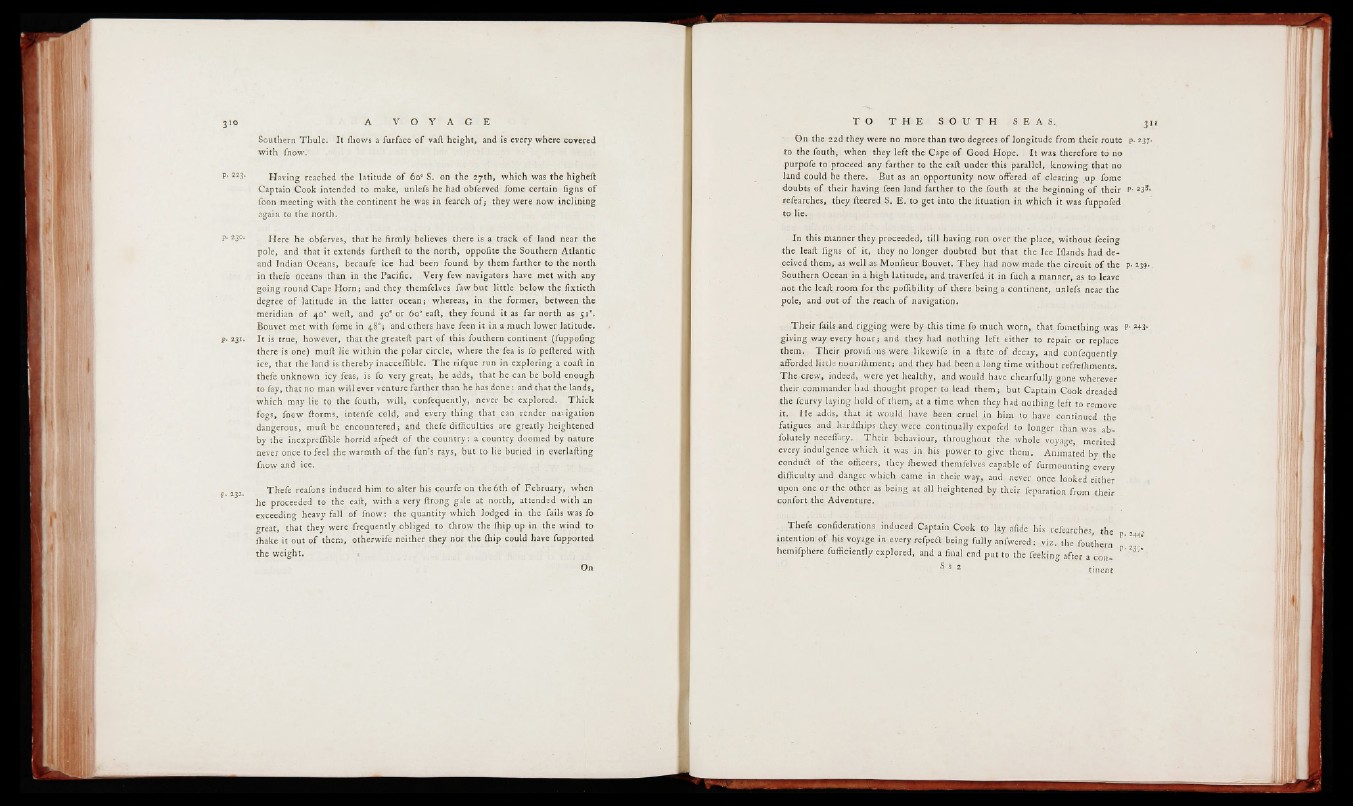
Southern Thule. It Shows a furface of vail height, and is every where covered
with fnow.
p. 223. Having reached the latitude of 6o° S. on the 27th, which was the higheil
Captain Cook intended to make* unlefs he had obferved fome certain figns of
foon meeting with the continent he was in fearch of; they were now inclining
again to the north.
p. 230. Here he obferves, that he firmly believes there is a track of land near the
pole, and that it extends fartheil to the north, oppofite the Southern Atlantic
and Indian Oceans, becaufe ice had been found by them farther to the north
in thefe oceans than in the Pacific. Very few navigators have met with any
going round Cape Horn; and they themfelves faw but little below the fixtieth
degree of latitude in the latter ocean; whereas, in the former, between the
meridian of 40° weft, and 50° or 6o° eaft, they found it as far north as 51°.
Bouvet met with fome in 48°; and others have Seen it in a much lower latitude.
P’ 231. It is true, however, that the greateft part of this fouthern continent (fuppofing
there is one) muft lie within the polar circle, where thefea is fo peftered with
ice, that the land is thereby inacceflible. The rifque run in exploring a coaft in
thefe unknown icy feas, is fo very great, he adds, that he can be bold enough
to fay, that no man will ever venture farther than he has done: and that the lands,
which may lie to the fouth, will, confequently, never be explored. Thick
fogs, fnow ftorms, intenfe cold, and every thing that can render navigation
dangerous, muft be encountered; and thefe difficulties are greatly heightened
by the inexpreflible horrid afpedt of the country: a country doomed by nature
never once to feel the warmth of the fun’s rays, but to lie buried in everlafting
fnow and ice.
P 232 Thefe reafons induced him to alter his courfe on the 6th of February* when
he proceeded to the eaft, with a very ftrong gale at north, attended with an
exceeding heavy fall of fnow: the quantity which lodged in the fails was fo
great, that they were frequently obliged to throw the Ship up in the wind to
ihake it out of them, otherwife neither they nor the Ihip could have fupported
the weight.
On
On the 22d they were no more than two degrees of longitude from their route p. 237.
to the fouth, when they left the Cape of Good Hope. It was therefore to no
purpofe to proceed any farther to the eaft under this parallel, knowing that no
land could be there. But as an opportunity now offered of clearing up fome
doubts of their having feen land farther to the fouth at the beginning of their P- 23**
refearches, they fleered S. E. to get into the Situation in which it was fuppofed
to lie.
In this manner they proceeded, till having run over the place, without feeing
the leaft figns of it, they no longer doubted but that the Ice Iflands had deceived
them, as well as Monfieur Bouvet. They had now made the circuit of the p. 239..
.Southern Ocean in a high latitude, and traverfed it in fuch a manner, as to leave
not the leaft room for the poflibility of there being a continent, unlefs near the
pole, and out of the reach of navigation.
Their fails and rigging were by this time fo much worn, that fomething was P* 243*
giving way every hour; and they had nothing left either to repair or replace
them. Their provisions were likewife in a ftate of decay, and confequently
afforded little nourishment; and they had been a long time without refreshments.
The.crew, indeed, were yet healthy, and would have chearfully gone wherever
their commander had thought proper to lead them; but Captain Cook dreaded
the fcurvy laying hold of them; at a time when they had nothing left to remove
it. He adds, that it wpuld have been cruel in him to have continued the
fatigues and hardships they were continually expofed to longer than was ab-
folutely neceflary. Their behaviour, throughout the whole voyage, merited
every indulgence which it was in his power to giye them. Animated by the
conduit of the officers, they Shewed themfelves capable of furmounting every
difficulty and danger which came in their way, and never once looked either
upon one or the other as being at all heightened by their feparation from their
confort the Adventure.
Thefe confideratibps. .induced Captain Cook to layafide his l-efearches, the 2 ,
intention' of his voyage in every refpedt being fully anfwered: viz.-the fouthern
hemifphere fufficient'ly explored, and a final end put to the feeking after a con- ^
i.1 S s 2 tinent